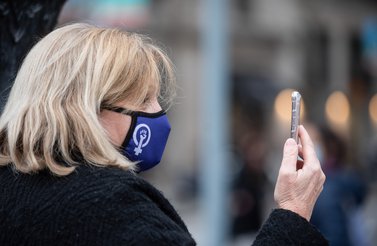The non-consensual dissemination of intimate images and videos is a vivid reality in Tunisia, according to major women’s rights organizations in the country. In November 2020, these organizations, among them L’Association Tunisienne des Etudes sur le Genre and l’Association Tunisienne des Femmes Démocrates (ATFD), participated in a study seeking to understand the extent to which the non-consensual dissemination of intimate images and videos persists within Tunisia. The organizations that were consulted have, in fact, supported more than 20 victims in past years, by providing either legal advice or access to psychological support; however, major challenges remain. The dissemination of non-consensual images is not yet part of the mainstream women’s rights discourse, an absence that affects the judicial response and development of civil society–led support systems for victims.
These findings were the result of a recent study conducted in October 2021 by the African Legal Think Tank on Women’s Rights. The researchers found that technology-facilitated gender-based violence is a persistent reality that results in psychological and physical trauma for victims, a harm further exacerbated by the common social response of victim blaming. These findings are further corroborated by a recent study conducted by Le Centre de Recherches, d’études de Documentation et d’Information sur la Femme (CREDIF) in 2019, which found that four out of five women are victims of cyber violence.
The COVID-19 pandemic and our increased presence online have drawn attention to the technology-facilitated violence and systemic attacks directed at human rights defenders, women in politics, journalists, bloggers, and women belonging to ethnic minorities, among other groups. However, there is the tendency to dismiss these forms of attack or diminish their effects, perhaps due to an assumption that they are less harmful because they are occurring online.
This misperception is particularly concerning in the North African region, where activists are working online in sensitive spaces of post-revolutionary and revolutionary dynamics. In fact, it was through research seeking to assess the extent to which the digital space was affected by the pandemic that the prominence of the digital space in online mobilization within the region emerged: “The role of the internet has been duly emphasised since the 2011 uprisings as the entire world has been ‘closely’ watching the socio-political events in North Africa. From popular uprisings to identity and cultural struggles, the internet has been a pro-democracy mass mobiliser and a tool against censorship.” However, as these new forms of mobilization have been transformed into persecution tools serving power reinforcement, less is said in regard to the nexus between the digital space and gender-based violence.
Tunisia’s constitution, enacted in 2014, states that all citizens, male and female, have equal rights and duties, and are equal before the law without any discrimination. In article 46, the state commits to protecting women’s accrued rights and to working “to strengthen and develop those rights,” and also commits to taking “all necessary measures in order to eradicate violence against women.” The amended penal code currently criminalizes rape, forms of sexual aggression and sexual harassment, as well as psychological forms of violence, including within a couple relationship. These amendments were driven by the adoption of a comprehensive law passed in 2017 to combat violence against women (58/2017), which addressed all forms of violence, including physical, economic, sexual, psychological and political. This law also expanded the penal code’s definition of domestic violence to include violence committed by former spouses and fiancés.
Even though Tunisia’s progressive legal framework on women’s rights proves to be the most progressive within the region, implementation remains a challenge, and the framework is still absent of references to technology-facilitated gender-based violence. In the context of the non-consensual dissemination of intimate images and videos, victims resort to criminal code provisions addressing protection and usage of personal data to access justice. Specifically, with the absence of a clear provision on technology-facilitated gender-based violence within the Organic Law n. 2017-58 of August 11, 2017, avenues for justice related to violence against women can be found in article 86 of the telecommunications code, and in Section V of the Criminal Code addressing the violation of people’s honour and reputation, through its articles 245 and 246.
However, resorting to the sections of the Criminal Code (which addresses defamation and calumny) proves to be challenging for victims who have provided consent in being recorded. In these cases, victims face the threat of being incriminated for the affront to public modesty, according to Section III, Subsection I of the Criminal Code.
Tunisia’s Organic Law 2004-63 on personal data ensures protection of personal data on its processing; however, cyber violence and various other forms of online violence are still not addressed.
This was the risk a young woman was facing in 2021, whose case was followed by one of the authors and recurred into a notary request for the removal of the content shared online. The young woman, who had consensually agreed to record an intimate video with her former partner, requested legal support against this former partner after he uploaded the video to a porn website without her consent. In fact, the consent the woman gave was exclusively to record the video for personal usage and without any agreement regarding further dissemination. Although the woman was not physically recognizable in the video, her voice exposed her identity. Since the consent given by the woman in recording the video might lead to her persecution for the affront to public modesty, the legal strategy adopted was to make a notary request to eliminate the video from the website and from any personal device. Such a case provides a broader picture of the challenges faced by victims of these crimes, which often involve victim blaming or a fear of being persecuted.
In contrast, South Africa’s Cybercrimes and Cybersecurity Bill and Prevention of combating of Hate Crimes and Hate Speech Bill have criminalized the non-consensual dissemination of intimate images and videos: if the victim can’t be identified in the content, the perpetrator can face two years in jail or pay a fine, or both; if the victim can be identified in any way, the perpetrator could be sentenced to four years in prison or pay a fine, or both. These bills provide a strong precedent and pave the way for countries across the African continent to regulate and provide a legislative response against the non-consensual dissemination of intimate images and videos.
Tunisia’s Organic Law 2004-63 on personal data ensures protection of personal data on its processing; however, cyber violence and various other forms of online violence are still not addressed. Attempts to subject the internet to real regulation, despite its supposed resistance and considering its global character, is made by conventions, treaties, regulations and other legal instruments. In the case of Tunisia, the Budapest Convention (Convention on Cybercrime of the Council of Europe) is the only international instrument addressing crimes committed via the internet and other computer networks. It also contains a series of powers and procedures, such as the search of computer networks and interception. Its main objective, set out in the preamble, is to pursue “a common criminal policy aimed at the protection of society against cybercrime,” especially “by adopting appropriate legislation and fostering international co-operation.” Tunisia was invited to accede to the treaty, as it is currently open for signature by the member states and the non-member ones.
The promotion of women’s equal rights and the elimination of discrimination against women are addressed in the International Bill of Human Rights, and in the Convention on the Elimination of All Forms of Discrimination Against Women, which acknowledges in its preamble that “extensive discrimination against women continues to exist,” and emphasizes that such discrimination “violates the principles of equality of rights and respect of human dignity.” Similarly, the Protocol to the African Charter on Human and Peoples’ Rights on the Rights of Women in Africa, known as the Maputo Protocol, guarantees non-discrimination on the basis of sex, equality before the law, and the elimination of discrimination against women. Its comprehensiveness relies on the inclusion of civil and political rights, economic, social and cultural rights, group rights, and health and reproductive rights.
In the case of the non-consensual dissemination of intimate images and videos, despite the progressiveness of the framework Tunisia has presented, the inflexibility of interpretation (which does not encompass digitally facilitated gender-based violence) poses a major threat to survivors; often, women are further victimized through harmful and negative gender stereotypes throughout the process. As a result, acts of online violence may force women to reduce their presence online. As mentioned above, the Tunisian constitution explicitly recognizes the necessity of taking all needed measures to protect women from any form of violence. Similarly, in the past decade, there have been significant soft law developments in the understanding and recognition of online gender-based violence in the international human rights framework on women’s rights and violence against women, such as the Convention on the Elimination of All Forms of Discrimination against Women, the Declaration on the Elimination of All Forms of Discrimination against Women, the Declaration on the Elimination of Violence against Women, and the Beijing Declaration and Platform for Action.
However, the lack of recognition of the non-consensual dissemination of intimate images and videos as a crime is further exacerbated by underlying challenges for victims in accessing justice, posed by law enforcement and judiciary and other response actors, as well as by internet intermediaries and civil society actors. The fact that states have obligations to prevent, investigate and punish acts of violence against women committed by private companies (such as internet intermediaries) and the fact that violations are perpetrated beyond the jurisdiction of states make it difficult for authorities to identify, investigate or prosecute perpetrators or provide justice for survivors of gender-based violence. Any improvement may require extraterritorial cooperation between states. As in the 2021 case of the young woman seeking to have video content removed from a website, without the notary request, internet intermediaries would have played a central role in the removal of non-consensual content; however, their responsibilities have not yet been fully addressed under the international human rights framework, even though online gender-based violence is usually perpetrated on privately owned platforms. In the case of Tunisia, the identified gaps in the legal framework are further exacerbated by the lack of training of law enforcement officials, which results in not only the lack of consideration of online abuse as a serious crime but also the persecution of the victims.
The limits of both the research on the subject and the funds to address the realities faced by women experiencing this online violence are undermining the many attempts being made by stakeholders to bring this problem to light. In Tunisia, the non-consensual dissemination of intimate images and videos constitutes a real threat to women across the country, one with detrimental consequences for their physical and psychological well-being.





